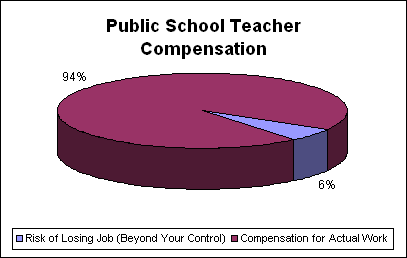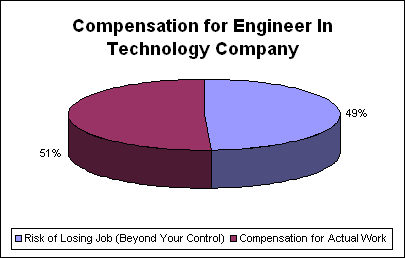How Much of Your Job Pay Is For Income Risk?
When I started my current career, I established a mental model of my job compensation that I believe helps me accumulate wealth.
I looked at the salary I was receiving for my job at a technoglogy company that is in a rapid changing environment and compared it to the salary of a public servant (such as a school teacher). Obviously there was a sizable difference in pay. However, the pay wasn't the only difference - I realized I was taking on considerable risk by working in my corporate job since my job could disappear at anytime.
Hence I began to associate that difference as a risk adjusted premium for working in my job. That is, I began to categorize nearly 50% of my pay as compensation for the risk I am taking of being laid off at nearly any point. Given my organization went through 3 rounds of layoffs in the 1st 3 years I was there and there has been a continous movement of positions overseas, I believed there was a sizable amount of risk involved in keeping my job. So I equated my compensation to be nearly the same as a public servant, but I was getting paid extra for the risk I was taking on to be in an unstable environment.
Example:
| Job Compensation | School Teacher | Engineer |
| Risk of Losing Job (Beyond Your Control) | $ 2,000.00 | $ 32,000.00 |
| Compensation for Actual Work | $ 33,000.00 | $ 33,000.00 |


This mental model is a little extreme. However, what it has done is pushed me to keep my consumption of income at a lower level and to save a larger percentage of my income for when I no longer have a job. If I am lucky enough never to be laid off, I have a nice cushion to add to my nest egg.
Related in Wealth Building:
2016 Passive Income: Dividends (Feb 24, 2017) Its been a couple years since I shared our passive income so I thought I would publish a summary of our 2016 dividend income. This passive income comes from our taxable stock portfolio. All retirement investment holdings are excluded from...
Household Debt Snapshot September 2011 (Sep 12, 2011) Here is an updated snapshot of our current debt (all mortgages on our primary and rental properties). The last debt breakdown I provided was back in March 2011 with a total of $356,358. Loan Description Property Balance Payment Matures 1...
Updated Household Debt Snapshot (Mar 23, 2011) Here is an updated snapshot of our current debt (all mortgages on our primary and rental properties). The last debt breakdown I provided was back in April 2010 with a total of $377,596. Loan Description House Current Balance Matures 1...


Comments (8)
Wait, your salary as an engineer is only $65k? That's what one of my buddies gets paid in his 1st year out of undergrad as a software engineer. I thought after 7-8 years you should be in the $90k's or so.
Posted by Mike | December 14, 2007 1:58 PM
This is a great way to look at income, particularly when comparing the varying incomes of two different professions.
Posted by Jason | December 14, 2007 10:46 PM
mike:
where does your buddy work? i like my odds of a 50% pay raise over there.
- s.b.
Posted by some body | December 15, 2007 12:05 PM
I agree with the philosophy, but I disagree with your ratios.
Sure, it's most likely easier for a school teacher to get a job should he or she lose it, but that's not to say that you CAN'T get a new job if you lose yours.
Sure, there are job market fluctuations that could influence WHERE you land a new job, but not IF you land a new job.
Also, don't devalue your own professional self worth. Should teachers be paid more? Absolutely. But in comparison to your field, teachers are not required to adapt to changing market forces like you are as an engineer.
New technology is your business. You better learn quick and adapt to changing job requirements, or your value to your company will deteriorate. A teacher on the other hand, probably doesn't have to adapt to change as quickly as you do.
Just my thoughts. It's good your stashing that cash, regardless of how you allocate your professional ri$k.
-Grant
Posted by Grant | December 15, 2007 12:50 PM
Mike, this was merely an example. I am not claiming this is my current salary.
Grant - the ratios are extreme I know, but it was this model that pushed me to save a lot more of my income over the past 6 years than many of my peers. I think the ratio is sliding down over time as my net woth increases and I have more savings available for hiccups along the way.
Posted by 2million | December 16, 2007 9:17 PM
s.b.: raytheon (large defense contractor). do you seriously only make in the mid $40's as an engineer? in recent years, the starting salary for electrical/computer/software engineers has skyrocketed. $50k starting at a startup, $60k and up at the large corporations.
Posted by Mike | December 17, 2007 10:45 AM
Hi 2 million,
I think that this issue is more complex than you think. As you get older, more experienced and accumulate more assets these issues will become more important.
The way I like to think about this (and this is not the only way) is to work backwards from the goal. Your goal seems to be 2 million in investment assets. I would calculate the number of years to retirement, my expected salary, investment rate of return, tax rate, inflation, fx exposure, etc. Then figure out how much you need to make per year to get to your goal. I would increase that number by 20% to create a cushion against falling short in certain years.
As you go along this road, there are:
1. Employment risk
2. Inflation risk
3. Asset deflation risk
4. Catastrophic portfolio failure risk
5. Insurance (health, life (especially important if you have young children), business, re liability) risk.
I don't see a lot of posts for insurance. I am guessing that this will be more pressing when you have children and start thinking about 529 plans, wills, trusts, estate planning and management, etc. If you don't know why you need this, ask yourself this: If your wife and you die in a car accident and your 2 year old children inherit your $x,x00,000 estate at once, how will they manage the money to adulthood and beyond?
This will add a lot of nuance to your plans going toward your retirement goals. When I had my first child, I was able to fully fund their college education on the day she was born because I planned for it many years before. I hope to do so when my second child is born as well.
Planning for life events is critical in a long term plan. You may have to care for your parents as I am in a this situation. Life throws a lot of curve balls at you. Start swinging the bat and be ready for these things today because inevitably they will come.
A good financial planning book should break down your basic life events to plan for. Unemployment should be one of them.
Best, ETFnerd
Posted by ETFnerd | December 31, 2007 10:32 AM
i'm getting paid 65k. first year out of school. granted, i live in california, and am paying taxes up the wazoo. but still... i work for the government. there is very little likelihood, if any at all, that i will be fired. and i'm not getting paid much less than you are - i pay about 700 in living expenses.
Posted by c | January 10, 2008 7:53 PM